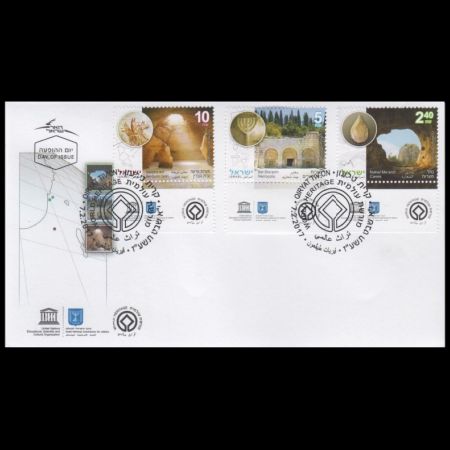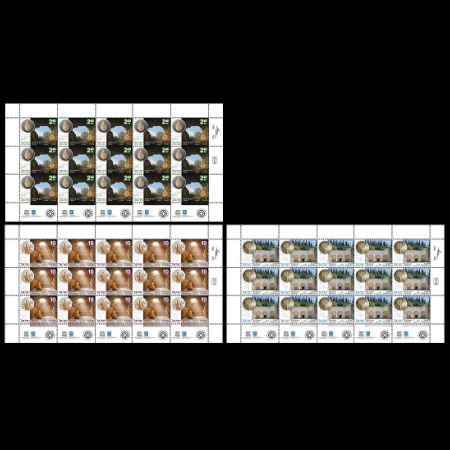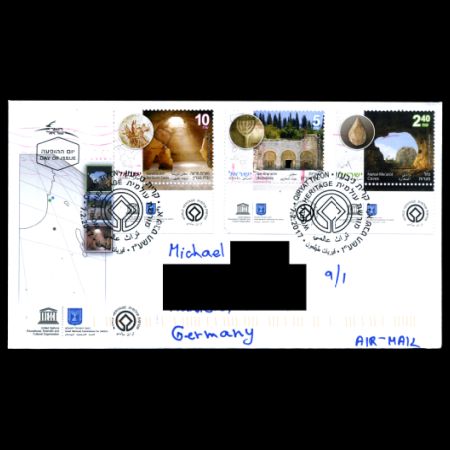Israel
2017
"UNESCO World Heritage Sites in Israel"
| Issue Date |
07.02.2017 |
| ID |
Michel:
Stanley Gibbons: UPU: IL009.17
Category: pR |
| Designer |
Ronen Goldberg |
| Stamps in set |
3 |
| Value |
IS 2.40 - Nahal Me'arot Caves
IS 5.00 - Bet She'arim Necropolis
IS 10.0 - Maresha and Bet-Gurvin Caves
|
| Size (width x height) |
30 mm X 40 mm |
| Layout |
3 sheet of 15stamps each |
| Products |
FDC x1 |
| Paper |
|
| Perforation |
13 |
| Print Technique |
|
| Printed by |
Cartor Security Printing, France |
| Quantity |
|
| Issuing Authority |
Israel Post Ltd. |
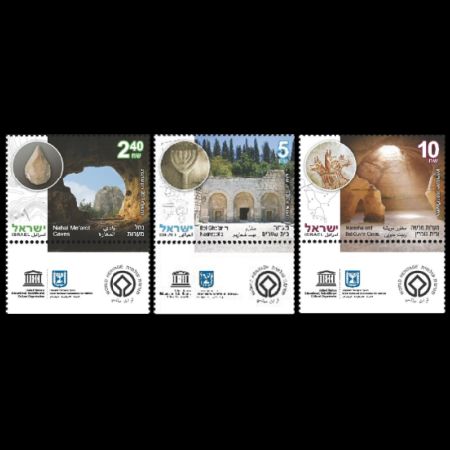
On February 7th, 2017 Israel Post issued a set of three
stamps with title "UNESCO World Heritage Sites in Israel"
In 1972, the United Nations Educational, Scientific and Cultural
Organization (UNESCO) approved an agreement to protect world heritage
sites. The program included rules to assess natural and cultural sites
and determine their significance to mankind's common cultural heritage.
Every country prepares a list of its sites and once a year the UNESCO
World Heritage Center conducts a special meeting to choose which of the
nominated sites shall be included in the list of United Nations World
Heritage Sites. In 2000, the agreement was ratified by the government
of Israel, and since then a number of Israeli sites have been added to
the list: Old City of Acre (2001), Masada (2001), White City of Tel
Aviv (2003), Biblical Tels – Megiddo, Hazor, Beer Sheba (2005), Incense
Route – Desert Cities in the Negev (Avdat, Mamshit, Haluza and Shivta)
(2005), Baha'i Holy Places (2008), Nahal Me'arot Caves (2012), Maresha
and Bet-Guvrin Caves (2014), Necropolis of Bet She'arim (2015).
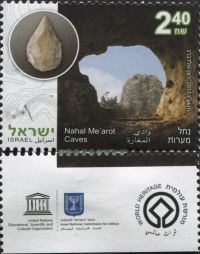 Nahal Me'arot
Caves
Nahal Me'arot
Caves
Four caves are carved into the mountain on the southern slope of Mount
Carmel, at the entrance to the Nahal Me'arot Caves. Archeological
excavations conducted at the site from 1928 to the present have
discovered evidence of human existence near and inside the caves over
hundreds of thousands of years. Among the many findings were remnants
of houses, various stone tools, jewelry, bones of animals used for food
and graves.
Neanderthals
may have lived side by side with early humans and possibly interbred
with them, according to new research. Stone axes and sharp
flint
arrowheads of both branches of the human race have been discovered in
limestone caves in northern Israel. The findings have led
archeologists to believe the two sub-species found harmony in a coastal
mountain range that today is in a state of war with its neighbours. one
of the bones uncovered at Nahal Me'arot - a World Heritage site -
had lethal wounds which suggested prehistoric men lived in peace with
each other 80,000 years ago |

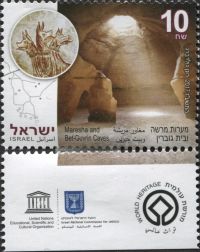 Bet She'arim Necropolis Bet She'arim Necropolis
Rabbi Yehudah Hanasi, leader of the Jewish people in the late 2nd
century CE, was buried at his behest in the cemetery in the town of Bet
She'arim in the western Jezreel Valley. Many others subsequently asked
to be buried near the final resting place of the admired leader. Dozens
of burial caves were dug into the hillside and on the outskirts of the
town. Jews were brought from all over Eretz
Israel and even from
faraway lands to be buried
there.The
hundreds of epitaphs found in the
caves provide information about the Jewish lifestyle in the 3rd and 4th
centuries CE.
Maresha and Bet-Guvrin
Caves
Residents of the city of Maresha, in the southern Judean plain, carved
many spaces beneath their homes into the soft chalk bedrock upon which
the city was built. These spaces served as water reservoirs,
agricultural production facilities, storage rooms, pigeon raising,
burial caves and more. After Maresha was destroyed in the 1st century
BCE a new city called Bet-Guvrin was constructed nearby. In the
Byzantine period, the townspeople carved bricks out of the chalk in
deep, bell-shaped caves. |
Products
References
Info Brochure
Israel Philately (the article does not exist anymore)
Dailymail

